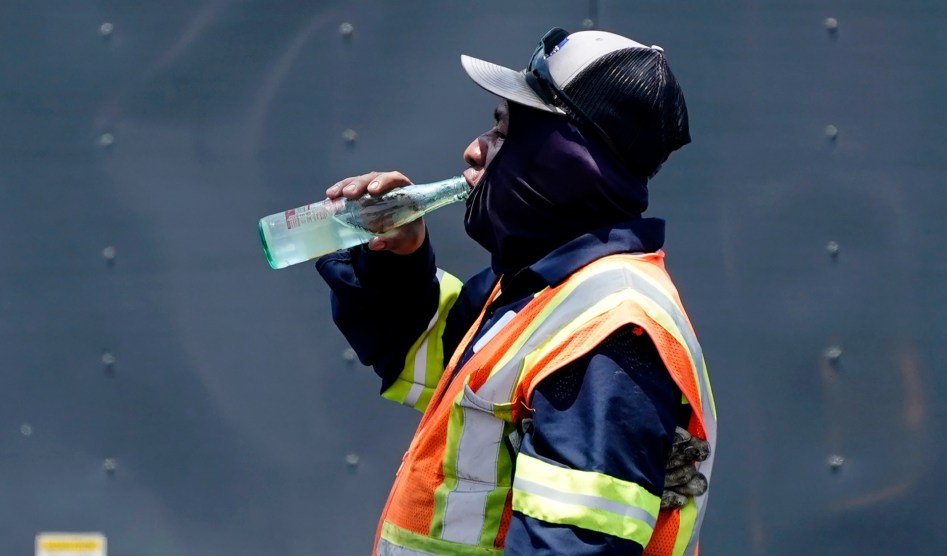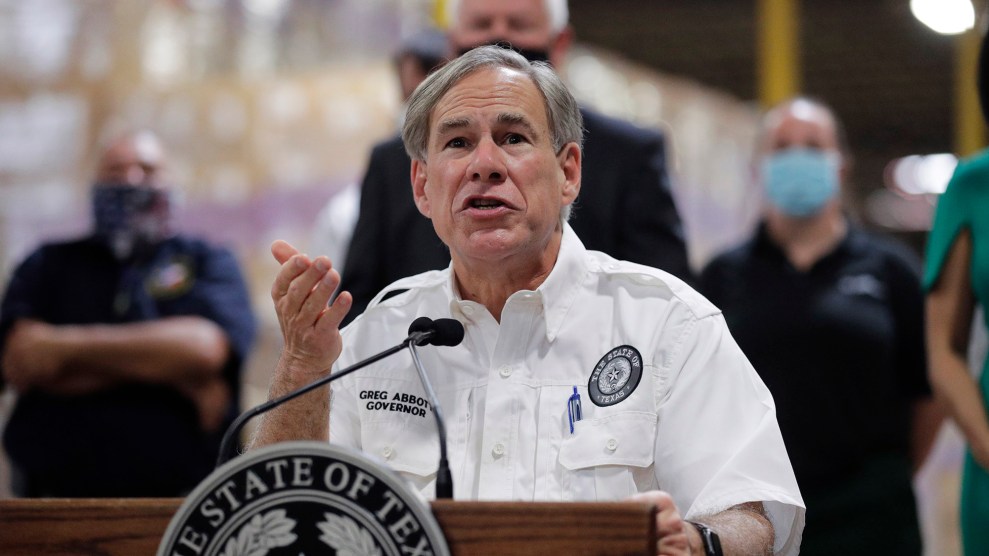
LM Otero/AP
This story was originally published by The Guardian and is reproduced here as part of the Climate Desk collaboration.
Amid a dangerous heatwave that has brought blistering temperatures across Texas, the state’s governor signed a law last week eliminating local rules requiring water breaks for workers.
The measure, which will take effect later this year, will nullify ordinances enacted by Austin and Dallas that mandate 10-minute breaks for construction workers every four hours. It also prevents any other local governments from passing similar worker protections.
Just days after Greg Abbott, the governor, ratified the law, officials said a 35-year-old utility lineman working to restore power in Marshall, Texas, died after experiencing symptoms of heat illness. The heat index—which takes into account both the temperature and humidity—was 100F while he was working.
It was an omen of what could come after HB 2127 takes effect in September, wrote the Texas branch of the AFL-CIO union, referring to the far-reaching law that not only curbs cities’ right to enact worker protections, but a number of labor, agriculture, natural resources, and finance measures. “Banning required rest breaks for construction workers in the Texas heat is deadly.”
The law’s passage has enraged workers’ advocates, who warn that it will result in even more heat-related deaths and illnesses in a state that already tallies the highest number of worker deaths due to high temperatures.
“In the midst of a record-setting heatwave, I could not think of a worse time for this governor or any elected official who has any, any kind of compassion, to do this,” said David Cruz, the communications director for League of United Latin American Citizens National (Lulac), a Latino civil rights group. “This administration is incrementally trying to move us backwards into a dark time in this nation. When plantation owners and agrarian mentalities prevailed.”
Six out of every 10 construction workers in Texas are Latino, and labor advocates say that the law will hurt Latino and Black communities that are already disproportionately affected by extreme heat. Hispanic workers made up a third of all worker heat deaths since 2010, according to an NPR/Columbia study.
Local protections are crucial, advocates say, because the federal Occupational Safety and Health Administration (Osha) does not have a national heat protection standard.
Still, the Republican lawmakers pushing the new law have said it eliminates a “hodgepodge of onerous and burdensome regulations” that Texas businesses face. The effort aims to prevent cities and counties from enacting progressive policies that counter the state Republican supermajority’s aims.
“For too long, progressive municipal officials and agencies have made Texas small businesses jump through contradictory and confusing hoops,” said Republican state representative Dustin Burrows, who introduced the bill.
After the state’s second-hottest summer on record last year, Democratic legislators introduced bills that would have set heat illness guidelines for Texas businesses and required mandatory breaks for government contractors, but those efforts failed to advance.
Such protections are crucial, advocates say, as the climate crisis brings hotter, more prolonged heatwaves. In Texas, the number of triple-digit temperature days have nearly doubled over the past 45 years, a state report found.
The Union of Concerned Scientists, which is tracking national extreme weather data, has flagged that more than half of Americans have faced an extreme weather alert in the past six weeks alone. About 11% of heat alerts during that period had a “climate signal” linking the weather to global heating.
This week, local officials and the National Weather Service have asked Texans to take precautions against heat stroke and heat exhaustion. The record-breaking heatwave is expected to worsen and expand in the coming days, with heat indexes forecasted to surpass 110F (43C).
“Oppressive and persistent heat will become increasingly dangerous and potentially deadly in south and south-central Texas, especially to people repeatedly exposed for long durations. Many locations in those parts of Texas have already experienced a yearly record number of hours of dangerously high heat index readings,” the National Weather Service said. “There is increasing confidence that the dangerous heatwave will continue through the beginning of the July Fourth holiday week.”
It is striking, said Cruz of Lulac, that Republican officials want to override local protections that cost businesses just 20 minutes of their workers’ productivity, to protect against catastrophic illness and death. “We have to take a stand for what is humane,” he said.












